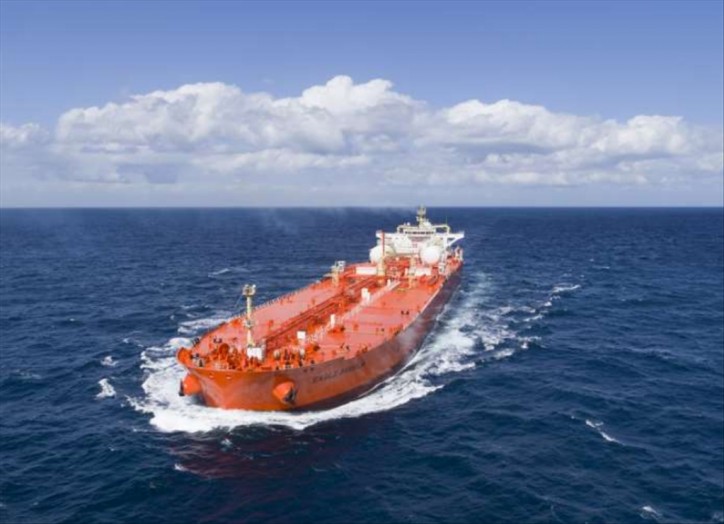Shell-chartered vessels built by SHI amongst first to enter into service
AET, one of the world’s leading petroleum and chemical tanker owners and operators, today named its first LNG dual-fuelled Aframax vessels, Eagle Brasilia and Eagle Bintulu. The vessels were inaugurated at a ceremony held at the Samsung Heavy Industry Co Ltd’s (SHI) shipyard in Geoje, South Korea. Both vessels have been taken on long-term charter by Shell International Trading and Shipping Company Limited (Shell), primarily for operations in the Atlantic Basin, and will begin operating for the company from Q4 2018.

Using LNG as a fuel eliminates sulphur (SOx) emissions by nearly 100 percent, nitrous oxide (NOx) emissions by 85 percent and particulate matter (PM) emissions by 98 percent, exceeding the International Maritime Organisation’s (IMO) MARPOL VI 0.5% SOx regulations due into force in 2020. The vessels are in compliance with NOx Tier III emission when operating in gas mode.
The vessels are equipped with conventional single screw propulsion with two-stroke main engine, three auxiliary engines and two auxiliary boilers, all equipped for LNG dual fuel capability. LNG fuel is supplied through two type-C tanks of 850 cubic metres each arranged on the main deck aft port and starboard. Each LNG tank is equipped with two LNG feed pumps which provide full redundancy for operation. The vessels are designed to receive LNG fuel from LNG bunkering vessels (via ship-to-ship transfer). The vessels will be able to trade with LNG fuel for approx. 6,000 nautical miles.
AET Chairman, and President/Group CEO of parent company MISC Berhad, Mr Yee Yang Chien, commented: “AET has worked for many years in close cooperation with industry partners to develop these LNG dual-fuelled aframaxes, which are amongst the very first in the industry. The MISC Group’s expertise in the handling of LNG and its use as marine fuel was leveraged upon too. The vessels have excellent environmental credentials, which will be achieved without detriment to the operational and commercial flexibility that these vessels can provide. To my mind, Eagle Brasilia and Eagle Bintulu are proof that as an industry, we needn’t see increasing environmental requirements as a threat to how we operate, but rather as an incentive to develop new, more innovative and sustainable shipping solutions.”
The environmental credentials of the vessels have been further bolstered with a range of ecoefficiency technologies. This includes an optimised hull form with various energy saving devices such as Asymmetric Rudder Bulb, SAVER Fin and SAVER Stator. Variable frequency drives (VFD) are applied for main sea water cooling pumps and mass type flow meters are installed to measure the fuel consumption. Overall, the EEDI for these vessels is about 28.8 percent above IMO Phase 0, bordering to phase 3 when operated in LNG mode.
Both vessels have been awarded the “Green Passport” and “GFS” notations and have been fitted with an IMO-compliant ballast water management system.
Mr Lars Wogen, Global Crude Freight Trading Manager, Shell commented: “Shell has been an advocate of LNG as a marine fuel for many years, and as an organisation, we have invested considerably in supporting the development of a comprehensive and reliable LNG bunkering infrastructure. We share AET’s commitment to exceeding the IMO’s 0.5% sulphur emissions requirements wherever possible, and we are very pleased to take these vessels on charter to serve our global energy shipping requirements. It is a privilege to work with AET, SHI and partners in showcasing the benefits of LNG dual fuelled solutions for the petroleum shipping segment.”
Captain Rajalingam Subramaniam, President & CEO, AET, said: “We welcome these vessels as the first in what will be an expanding fleet of LNG dual fuelled vessels in the years to come, as part of our Group’s Green Sustainability Agenda. This seeks to deliver environmental efficiency alongside operational excellence. This is a point of critical importance, as ensuring that these LNG dual-fuelled aframaxes are designed to operate with optimum efficiency, the highest standards of safety and compliance has been and remains top priority for us. Under the careful management of our shipmanagement division, Eaglestar, we look forward to ensuring our effort benefits the industry. I would also like to thank the Shell Group, for working with us in this pioneering effort.”
Source: MISC